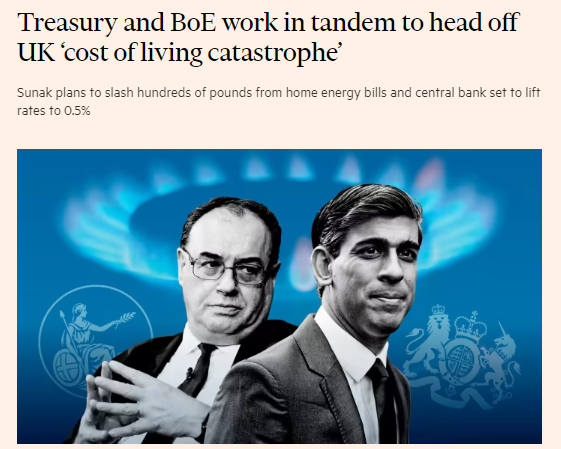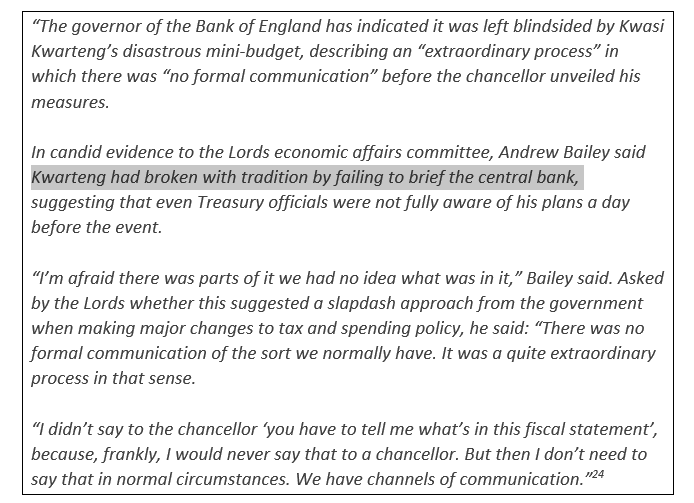Kwasi #Kwarteng would not have realised, when he first announced his intention to be a tax-cutting, pro-growth, fiscally-responsible #Chancellor that he had immediately set in motion the daggers that would be thrust in his back 38 days later.
/1
/1
The Bank of England, guardian of the nation’s wealth and cornerstone of its economic management originally started life as a private company, funded by subscription under Royal Charter in 1694, as a means to finance the public purse, depleted by various wars.
/2
/2
The original introduction by Patterson as to the Bank’s purpose, still holds good today, although the Bank of England has now become a public institution - our central bank - also viewed as the ‘lender of last resort’.
/3
/3
The Bank was nationalised by Attlee in 1946. Things went downhill from there.
/4
/4
In 1997, the Chancellor Gordon Brown, immediately after the Blair landslide General Election victory, set in motion events whereby in 1998 the Bank became “wholly owned by the Treasury Solicitor on behalf of the Government”.
/5
/5
Its mandate became “to support the economic policies of the government of the day” and achieve “independence in maintaining price stability.” This was acclaimed at the time as ‘setting the Bank free’ but with hindsight, it did anything but!
/6
/6
The Bank effectively became subservient to the Treasury and took over responsibility for Monetary Policy thus absolving Treasury of a whole heap of economic responsibility and accountability!
/7
/7
For its part, this ‘deal with the devil’ meant the Bank too was relieved of accountability provided it did its master’s bidding. It was no longer the respectable (if somewhat antiquated) ‘old lady of Threadneedle Street’.
/8
/8
It had become a promiscuous ‘lady of the night’ owned by the #Treasury. #Brown’s 1998 Bank of England Act had created a canker at the heart of British Government with disastrous results.
/9
/9
#Treasury could wash its hands of fiscal accountability since interest rates were set by the #Bank. Treasury could also wash its hands of financial #accountability since government debt was managed by the Bank.
/10
/10
Then in 2010 George #Osborne created the Office of Budgetary Responsibility (#OBR), allegedly an independent fiscal watchdog. #OBR's forecasts have been epic fails.
/11
/11
“Tax rises loom OBR forecasts have wrong years;”
“Why did the OBR get its forecasts so wrong?”
Regarding the Hunt Autumn Statement 2022 “OBR watchdog chief admits borrowing forecasts are 'almost certain to be wrong'!”
/12
“Why did the OBR get its forecasts so wrong?”
Regarding the Hunt Autumn Statement 2022 “OBR watchdog chief admits borrowing forecasts are 'almost certain to be wrong'!”
/12
As a watchdog, #OBR’s credibility depends on its own accuracy – otherwise it can hardly throw bricks around the glass house as its role demands. So was OBR supplied with poor data or information by HM Treasury and if so, why didn’t the OBR say so?
/13
/13
In 2022, since the OBR under the Sunak regime now appears to be the “arbiter of Britain’s Autumn Budget.” You have to wonder what is left for Treasury to actually do? What is it now accountable for ? Debt? NO! Price hikes? NO!! Fiscal policy? NO!!!
/14
/14
This statement glosses over so many inconvenient truths such as the fact that the Prime Minister is the 1st Lord of the Treasury (vital so the PM can command the war chest, a common sense logic degraded by Cameron & used to undermine #Boris!
/16
/16
Who did the undermining, the backstabbing? The person who should have been #Boris' wingman, his #Chancellor. Store that thought for a moment...
/17
/17

#OBR apparently now sets policy; the #Bank deals with government debt and national interest rates so what actually does ;Treasury do except perhaps fulfil the role of a grossly inflated and myopic accountant?
/18
/18
Why are #Treasury’s budgetary control systems still so enduringly ineffective?
💼 HM Treasury pays lip service to IFRS accounting standards;
💼HM Treasury does not use double entry but instead prefers the inexactitude of cash accounting;
/19
💼 HM Treasury pays lip service to IFRS accounting standards;
💼HM Treasury does not use double entry but instead prefers the inexactitude of cash accounting;
/19
💼 Over-reliance on spreadsheets allows errors to go undetected, models are wrong; data cannot be reliably aggregated, consolidated or interrogated.
/20
/20
💼For political PR purposes, #Ministers can re-announce #spend that may already be committed because its attribution is opaque and untraceable over the entirety of government spend;
/21
/21
💼Treasury, and not the 1st Lord of the #Treasury, or even the 2nd, appoints the permanent head of each central government department to be its accounting officer;
/22
/22
💼Lack of budgetary systems allows departmental data to remain safely compartmentalised instead of being exposed to the scrutiny by the 1st & 2nd Lords of the #Treasury, the PM & Chancellor respectively, whose primacy in the financial well-being of the realm is overturned;
/23
/23
Please go to continuing thread. (Twitter limit)
💼Poor systems of governance capability left the UK government is exposed to the risks detailed by BCBS239 (published as a result of the 2008 banking ‘too big to fail’ crisis).
/24
/24
BCBS239 explicitly addresses the need for ‘effective risk data aggregation and risk reporting’ and points to the lack of liquidity overview as a key risk factor.
/25
/25
Is this failure deliberate and if so, why hasn’t the #Bank cried ‘wolf’?! If the following (written by a Belgian company discussing BCBS239) applies to banks, then surely it is even more relevant to the national finances?
/26
/26

When #Kwarteng was appointed #Chancellor, he probably knew he was stepping into a hornet’s nest but not the extent or depth of it. (Nor, even though more aware, did #Truss see this...)
/28
/28
Effectively, the role of the #Treasury had been outsourced to the #Bank of England & the #OBR – out of range of accountability for performance or fiduciary matters. This enabled Treasury to act freely & without political consequence: all the checks & balances had been removed
/29
/29
In announcing his planned measures, and certainly following the sacking of Scholar, the #Treasury panjandrums immediately signalled the #Bank of England their extreme displeasure at having their cosy domicile disrupted by #Kwarteng. The Guardian even spelled it out for us:
/30
/30

The #Treasury, in the best tradition of “Yes, Minister” leaked like a sieve and cue’d up the #Bank who duly delivered the stiletto in the form of a hasty and unprecedented announcement which led to market turmoil as it drained confidence!
/33
/33

Thus we understand the hitherto peculiar behaviour & hasty pronouncements of Andrew #Bailey who promptly sank the knife into #Kwarteng’s back and paved the way for #Sunak to enter No. 10 without a vote being fired in anger.
/35
/35
The one thing that might have saved all those defenestrated by #Sunak, is the simple precaution of appointing new people to top roles in the #Bank or #OBR before trying to change the culture in the Kremlin, sorry, the #Treasury.
/36
/36
No one elected the #Governor of the Bank of England.
No one elected #Sunak.
This is why #Kwarteng should have sacked #Bailey. This is how #Sunak achieved his coup!
This was the lie!
/end.
No one elected #Sunak.
This is why #Kwarteng should have sacked #Bailey. This is how #Sunak achieved his coup!
This was the lie!
/end.

• • •
Missing some Tweet in this thread? You can try to
force a refresh

 Read on Twitter
Read on Twitter











